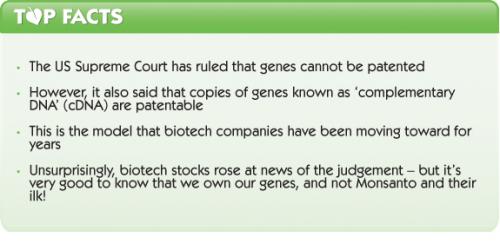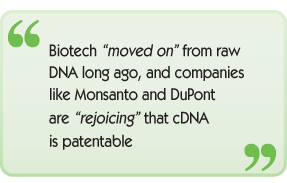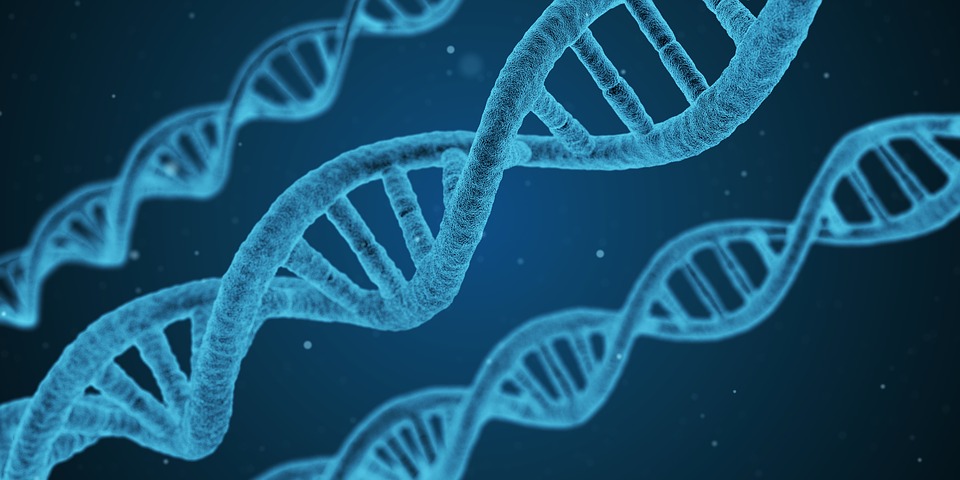Don’t misunderstand us: the US Supreme Court ruling that our genes belong to us, rather than corporations, is wonderful news. But biotech stock prices jumped at the news. Why?
Restoring property rights – over ourselves
Ever since 1980, when the Diamond vs. Chakrabarty case set a precedent that genetically modified organisms are patentable, the US Patent Office has been busily granting patents over animals, plants and other biotechnology products – including genes. This means human genes as well, and with much of the industrialised world getting involved, it wasn’t long before much of the human genome became the subject of patent claims.

Clearly, corporations’ control of our gene sequences has the potential for mind-boggling profits. Which is why it came as a pleasant surprise when the generally corporation-friendly US Supreme Court unanimously ruled last week that patents on the BRCA1 and BRCA2 breast cancer genes held by Myriad Genetics were, “Invalid because they covered products of nature”. By extension, all ‘raw’ DNA sequences are unsuitable for patent protection – thus erasing those juicy profits at a stroke.
Hang on – what about Monsanto?
The gene patenting decision comes hard on the heels of another Supreme Court ruling on corporate ownership of genetic resources, when it sided with Monsanto to declare that farmers cannot plant the company’s GM soybean seeds without paying it a fee – even if those seeds came from a grain elevator. Grain elevators are generally used to store seed for animal feed and industrial use, and the defendant in the case, Indiana farmer Vernon Hugh Bowman, took the innovative route of, “Plant[ing] them and spray[ing] them with [Monsanto’s glyphosate-containing fertiliser] Roundup. Many plants survived, and he replanted their seeds”. Monsanto is notorious for its legal pursuit of small farmers over patent claims on its GM seeds.
Apparent inconsistency
What the Supreme Court has effectively done is to bring the legal treatment of gene patents into the technological world of the 21st century. It has jettisoned patent protection on ‘raw’ human DNA sequences while upholding that protection for so-called complementary DNA (cDNA, referred to in the judgement as ‘composite’ DNA). cDNA consists only of the ‘exons’, the part of the DNA gene sequence that encodes the protein product of that gene, minus the ‘introns’ that are removed during the process of transcription.
Squaring the circle
In so doing, the Supreme Court has tried to square the circle of modern biotechnology: “A naturally occurring DNA segment is a product of nature and not patent eligible merely because it has been isolated, but cDNA is patent eligible because it is not naturally occurring”.
This explains why biotech company spokespeople lambasting the Luddite attitude of the Supreme Court have been conspicuous by their absence since the judgement. Biotech “moved on” from raw DNA long ago, and companies like Monsanto and DuPont are “rejoicing” that cDNA is patentable: “Between 2000 and 2010, the percentage of gene patents that claimed human DNA sequences has declined from 58 percent to 19 percent, while the percentage of gene patents that claimed synthetic DNA has risen from 14 percent to nearly 40 percent...it doesn’t really matter who owns a gene – it’s what that they do with it that counts.”

Biotech stocks bounce
Perhaps that’s why Myriad’s stock price rose after the Supreme Court patent ruling, just as it did after Angelina Jolie announced she had undergone a double mastectomy based on the results of Myriad’s BRCA1 gene testing. So it’s win-win for Myriad, which will now undoubtedly sell plenty more tests, at a reduced price thanks to the Supreme Court, to women scared into testing by Jolie’s revelation and its subsequent media handling. “I hope that this ruling will lead to more women at risk of breast cancer being able to get access to gene testing and to take control of their lives, not just in the US but around the world – whatever their means and whatever their background,” she said.
Time will tell how the biotech industry adapts to the new landscape ushered in by the Supreme Court ruling. But it’s nice to know that your genes aren’t owned by companies like Monsanto, isn’t it?








Comments
your voice counts
There are currently no comments on this post.
Your voice counts
We welcome your comments and are very interested in your point of view, but we ask that you keep them relevant to the article, that they be civil and without commercial links. All comments are moderated prior to being published. We reserve the right to edit or not publish comments that we consider abusive or offensive.
There is extra content here from a third party provider. You will be unable to see this content unless you agree to allow Content Cookies. Cookie Preferences